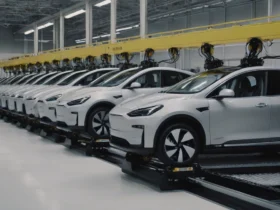Discover how Microsoft’s daring move to recruit top OpenAI talent signals a new era in AI development and what it means for the tech world

In a move that’s set the tech world abuzz, Microsoft has recently announced the hiring of former OpenAI CEO Sam Altman and co-founder Greg Brockman. This strategic decision not only marks a significant shift in the AI landscape but also raises compelling questions about the future of artificial intelligence and its role in our daily lives.
The Impact of High-Profile Recruitments in AI
Altman’s departure from OpenAI and subsequent recruitment by Microsoft, alongside Brockman, is not just a routine corporate reshuffle. It’s a clear signal that Microsoft is doubling down on its commitment to advanced AI research. This move is particularly noteworthy considering Altman’s reputation as a visionary in the AI space. His leadership at OpenAI saw groundbreaking developments in AI technology, pushing the boundaries of what’s possible.
The addition of Altman and Brockman to Microsoft・s roster is poised to catapult the company to the forefront of AI innovation. It’s a strategic play that positions Microsoft as a frontrunner in the race to harness AI’s full potential. This development isn’t just about corporate maneuvering; it’s about shaping the future of technology.
Why This Matters for the Tech World
Microsoft’s decision to onboard Altman and Brockman, along with key OpenAI talent, is more than just an expansion of their team. It signifies a potential shift in AI research and development dynamics. Traditionally, AI advancements have been driven by a combination of academic research and independent corporate projects. Microsoft’s move could herald a new era where large tech conglomerates play a more dominant role in AI’s future trajectory.
This shift could lead to accelerated AI development, potentially resulting in more sophisticated and integrated AI solutions in various sectors. However, it also raises questions about the concentration of AI expertise and resources within a few large corporations and the implications for innovation and competition in the field.

Exploring the Broader Implications
Microsoft’s integration of Altman and Brockman’s expertise could lead to significant advancements in AI-driven solutions, impacting industries far and wide. From healthcare to finance, the potential applications of advanced AI are vast and varied. This isn’t just about creating smarter algorithms; it’s about leveraging AI to solve real-world problems and improve efficiency and productivity across the board.
Consider, for instance, the realm of document management systems (DMS). In a world where data is king, the ability to efficiently manage, process, and analyze large volumes of information is crucial. AI-driven DMS solutions, such as PaperOffice, are revolutionizing the way businesses handle their documents, offering streamlined, automated, and intelligent document management capabilities.
The integration of AI into DMS exemplifies how AI can be a game-changer in everyday business operations. By automating routine tasks, providing sophisticated data analysis, and enhancing security measures, AI-driven DMS platforms are transforming the way organizations manage their information assets. In a world where efficiency and data-driven decision-making are paramount, the role of AI in document management cannot be overstated.
The Future of AI in Business and Beyond
As Microsoft forges ahead with its new AI research team, the implications for businesses and consumers are immense. We’re likely to see more intuitive, responsive, and efficient AI solutions across various sectors. This could mean more personalized customer experiences, streamlined business processes, and even breakthroughs in fields like healthcare and environmental sustainability.
However, this exciting future isn’t without its challenges. Issues surrounding AI ethics, privacy, and security remain at the forefront of discussions. As AI becomes more integrated into our daily lives, addressing these concerns will be crucial in ensuring that the benefits of AI are realized responsibly and equitably.
In conclusion, Microsoft’s latest move signals a new chapter in AI development. By bringing together some of the brightest minds in the field, the company is not only bolstering its position in the tech industry but also shaping the future of AI. As we stand on the brink of a new era in technology, the possibilities are as thrilling as they are vast.






Leave a Review